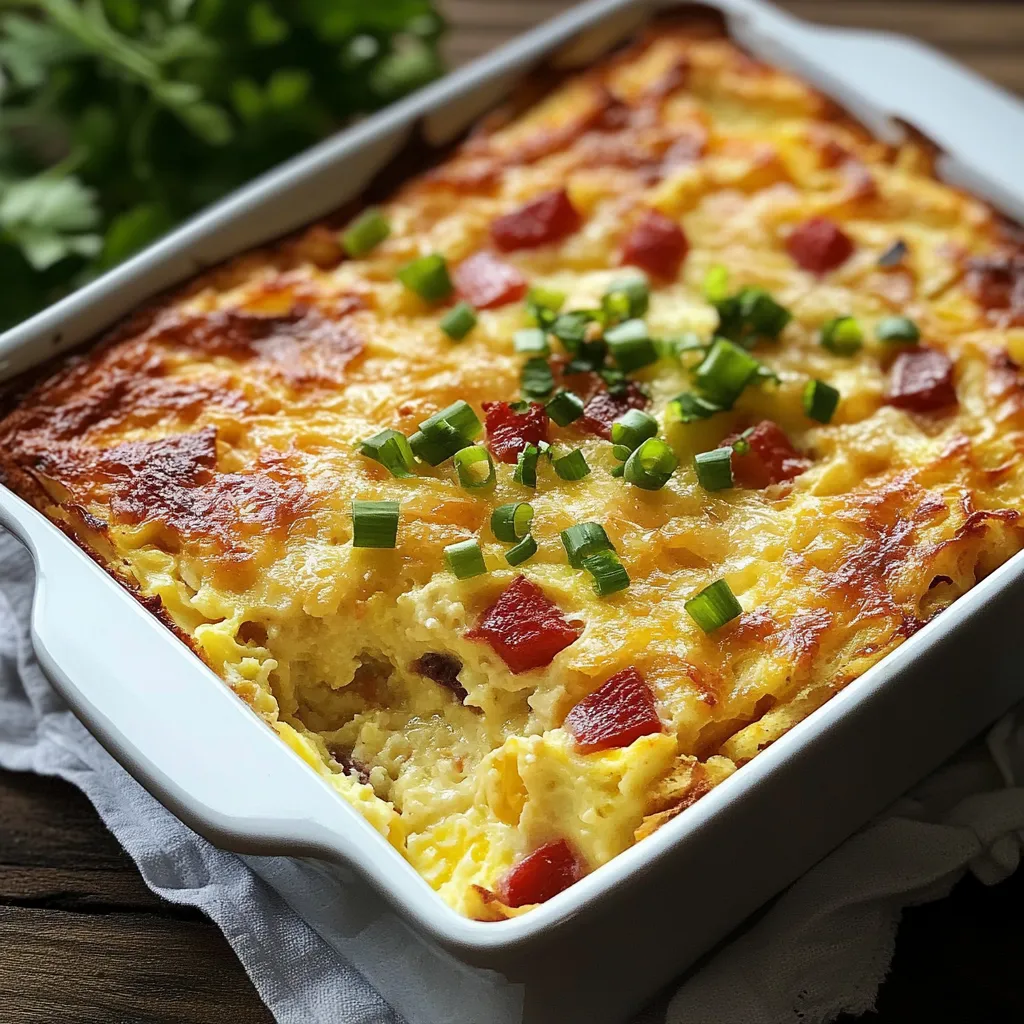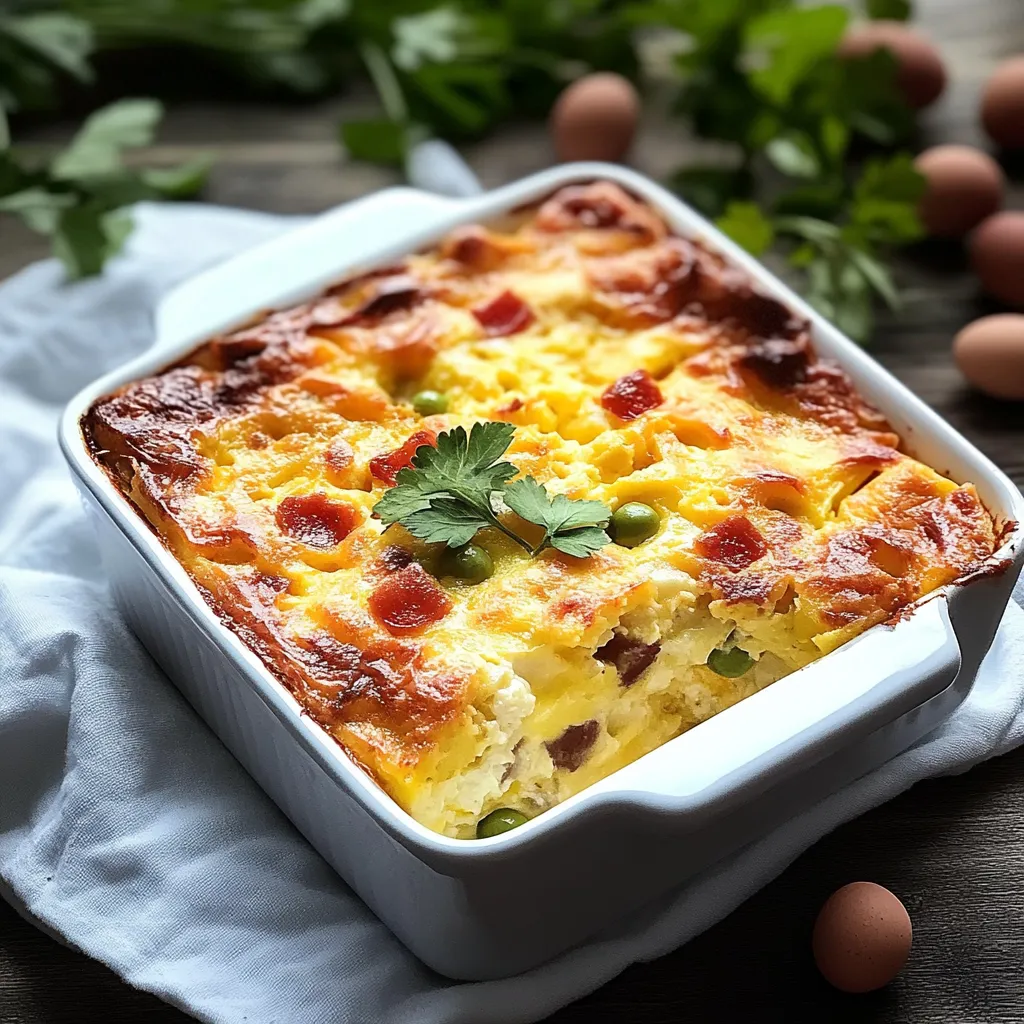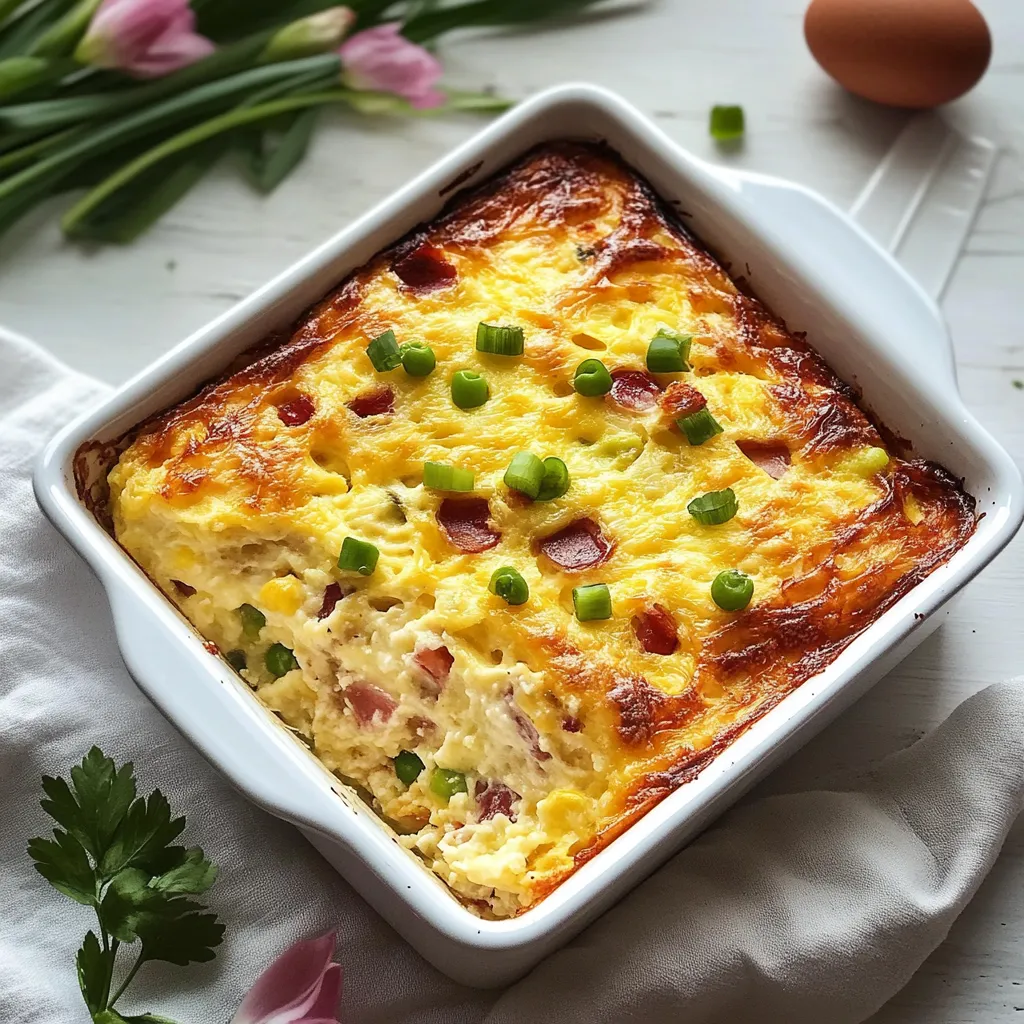 Pin it
Pin it
This Easter breakfast casserole transforms everyday ingredients into a festive morning meal that feeds a crowd with minimal effort. I've been making this casserole for our family gatherings for years, and it never fails to please everyone from picky children to discerning in-laws.
I first created this recipe when hosting my first Easter brunch as a newlywed. What started as a practical solution to feed overnight guests has become our most requested holiday tradition.
Ingredients
- Eggs: Use large eggs at room temperature for even cooking and better volume
- Milk: Whole milk creates the richest custard, but 2% works well too
- Salt and pepper: Simple seasonings that bring all the flavors together
- Sausage or ham: Pre-cooked protein adds savory depth, choose your family's favorite
- Day-old bread: Slightly stale bread absorbs the egg mixture without becoming soggy
- Cheddar cheese: Sharp cheddar provides the best flavor contrast, but any melting cheese works
- Green onions: Optional but adds a mild onion flavor without overwhelming the dish
- Bell peppers: Optional for color and vitamin C, use any color you prefer
Step-by-Step Instructions
- Preheat Oven:
- Set your oven to 350°F and position the rack in the middle. A properly preheated oven ensures even cooking throughout this deep casserole.
- Mix Egg Base:
- In a large bowl, vigorously whisk the eggs until frothy before adding milk, salt, and pepper. This creates an airier texture in the finished casserole. The custard base should be completely uniform in color.
- Prepare Baking Dish:
- Thoroughly grease a 9×13-inch baking dish, getting into all corners and halfway up the sides. This prevents sticking and makes serving much easier later.
- Layer The Foundation:
- Spread the cubed bread evenly across the bottom of the dish. Press down gently to create a level surface without compacting too much. The bread should still have some air between pieces.
- Add Protein And Flavor Boosters:
- Distribute the cooked sausage or ham evenly over the bread layer. Follow with an even layer of shredded cheese, then sprinkle green onions and bell peppers if using. Each bite should contain a bit of everything.
- Pour And Soak:
- Pour the egg mixture slowly over everything, making sure to hit all areas. Use a spatula to gently press the top ingredients down, allowing the custard to soak into the bread. Take your time with this step—it's crucial for texture.
- Initial Covered Bake:
- Cover the dish tightly with aluminum foil and bake for exactly 25 minutes. The foil traps moisture and helps the eggs cook evenly without the top browning too quickly.
- Final Uncovered Bake:
- Remove the foil carefully to avoid steam burns and return to the oven for 10 more minutes. The top should become golden brown and slightly puffy. Check doneness by inserting a knife in the center—it should come out clean.
 Pin it
Pin it
My favorite version of this casserole includes Italian sausage and roasted red peppers. The combination reminds me of my grandmother's pizza rustica that she would make for Easter morning when I was growing up in Pennsylvania.
Make It Your Own
This casserole welcomes endless variations based on what you have on hand. Try cooked bacon instead of sausage, swap cheddar for Gruyère or pepper jack, or add sautéed mushrooms and spinach for an earthy flavor profile. Even the bread can be switched—croissants create a more decadent version, while whole grain bread adds nutty notes and extra fiber.
Storage and Reheating
Once cooled, cover leftovers tightly with plastic wrap or transfer to airtight containers. The casserole will keep in the refrigerator for up to 3 days. For best results when reheating, use a 325°F oven for about 15 minutes rather than the microwave, which can make the texture rubbery. Individual portions can be frozen for up to 2 months—thaw overnight in the refrigerator before reheating.
Serving Suggestions
This versatile casserole pairs beautifully with lighter sides that balance its richness. Serve alongside fresh fruit salad, yogurt with honey, or roasted asparagus for a complete Easter brunch. For an elegant presentation, garnish with fresh herbs like chives or parsley just before bringing it to the table. A simple arugula salad with lemon vinaigrette makes an excellent accompaniment if serving this for lunch.
 Pin it
Pin it
Enjoy this Easter breakfast casserole with your loved ones and create cherished holiday memories together.
Frequently Asked Questions
- → Can I prepare this breakfast casserole the night before?
Yes! This casserole is perfect for preparing ahead. Assemble all ingredients in the baking dish, cover with plastic wrap, and refrigerate overnight. In the morning, remove from the refrigerator 30 minutes before baking, then follow the normal baking instructions, adding 5-10 minutes to the total baking time since it will be starting cold.
- → What can I substitute for sausage?
Ham works perfectly as mentioned in the recipe. Other excellent protein options include cooked bacon, turkey sausage, plant-based meat alternatives, or even leftover Easter ham. You could also make it vegetarian by omitting the meat and adding extra vegetables like mushrooms, spinach, or roasted vegetables.
- → What kind of bread works best?
Day-old Italian or French bread provides excellent texture. Sourdough, brioche, or challah also work wonderfully. The key is using slightly dried bread that will absorb the egg mixture without becoming soggy. Fresh bread can be cubed and left out uncovered for a few hours or lightly toasted to dry it slightly.
- → Can I add other vegetables to this casserole?
Absolutely! Beyond the optional green onions and bell peppers, try adding spinach, kale, sautéed mushrooms, diced tomatoes (well-drained), or roasted asparagus. Just ensure vegetables with high water content are pre-cooked to remove excess moisture that could make your casserole soggy.
- → How do I know when the casserole is fully cooked?
The casserole is done when the eggs are completely set and no longer jiggly in the center. The top should be golden brown, and a knife inserted in the center should come out clean without any runny egg mixture. Letting it rest for 5-10 minutes after baking helps it set up for cleaner slicing.
- → Can I freeze leftovers of this breakfast casserole?
Yes, leftovers freeze well. Cut the cooled casserole into individual portions, wrap each piece in plastic wrap and then foil, and freeze for up to 2 months. Reheat covered in the microwave or in a 325°F oven until heated through.
